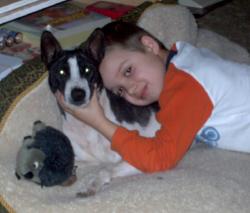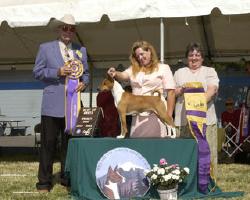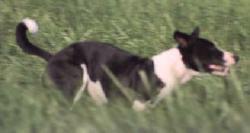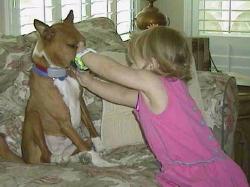Basenjis are one of the world's oldest "pure" breeds of dogs. Drawings and
carvings of them have been found in the tombs of Pharaohs in ancient Egypt dating them back over 5,000 years. Throughout this time, the Basenji has remained virtually unchanged. Unlike most breeds of dogs, the Basenji was not created by man but instead was created by Mother Nature herself. Nature selected the animals who would be deemed worthy of reproducing the next generation of Basenjis by a matter of "survival of the fittest". It was a tough world and only the most intelligent, strongest, healthiest animals with good hunting instincts were around long
enough to continue the breed.
Basenjis have enjoyed a symbiotic relationship with their African tribesman owners throughout time. The Basenji would be fitted with a wooden hunting bell that would make noise to drive prey towards his owner. The owner would then either net or spear the prey thus providing his family with food. The jungles of Africa are quite dense and rough in many areas. The Basenji was well adapted to hunting in these conditions. His small size allowed for maximum agility through the brush. His short, close coat would not snag on briers and his tough skin is not easily damaged by thorns. His coat carries no odor and thus helps protect him from becoming prey for a larger beast. His small, upright, curly tail would not be damaged easily by whipping through the brush as a long straight tail would be. His upright, hooded ears catch even the tiniest sounds of his prey. His far-seeing eyes can spot prey over long distances. The jungles are dense and prey may be few and far between so the Basenji had to have stamina. He is classified as a Sighthound by the American Kennel Club but true fanciers know that he hunts by both sight and by scent.
A person must never forget the origins of the Basenji in order to be a good owner. A Basenji must always be on a leash or in a securely fenced yard at all times as his hunting instincts are still quite pronounced and he is likely to dash off in pursuit of a squirrel or perhaps the scent of a neighbor's barbecue. When the hunting instincts kick in, he is unstoppable and is very likely to dash off in in his pursuit of game. Please don't think that you can train a Basenji to stay in your unfenced yard either. Five thousand years of instinct cannot be
curbed so easily. Being struck by an automobile is the most common cause of death for a Basenji.
Basenjis are a true "pack" animal and desire a structured home where all members know their order within the pack. A pack is led by an Alpha figure and it is the Alpha that makes and enforces the rules. A Basenji needs and respects an owner who is firm but fair as their Alpha. Most Basenjis are naturally dominant and
desire a high-ranking position within their pack. If the Basenji views his owner as "unfit" for the Alpha position, the Basenji will move into the position, frequently becoming aggressive in order to re-inforce his new rank. An owner can prevent this from happening by socializing their puppy well with both people and other animals and by teaching their dog to be submissive to them from the beginning.
Basenjis are very bright dogs but this does not mean that they are necessarily easy to train. Keep in mind that the Basenji was never bred to be a subservient follower of mankind but instead relied upon his intelligence for survival. He is a free-thinking individual that sees no reason to blindly follow a given order.
It is up to the owner to give the dog a reason and the owner can accomplish this with positive training techniques. The author finds her Basenjis to be eager and willing pupils that learn quickly and have fun while learning. The author uses a combination of training methods with her dogs and has found that clicker
training is by far the best method to use with Basenjis.
The Basenji is a very active dog with a tremendous amount of energy for his size. Owners must commit to providing the dog with proper exercise, both physical and mental, every day. A bored or under-exercised Basenji can be extremely destructive. One or two short walks a day is not enough exercise for most Basenjis. Ideally, they should receive a long walk or run every day with indoor play periods also. Even better would be a home where the dog will be involved in sports such as lure coursing, conformation, agility, obedience, tracking, or therapy work. These sporting events are a great way to spend quality time with both your family and your pet.
A question that the author frequently hears is, "Are they good with kids?" There is no black or white answer for this question for each child and each dog is an individual and every circumstance may be different. Most Basenjis do tend to be good with gentle, well-behaved children if the dog was well socialized with them
as a puppy. However, many Basenjis simply will not tolerate being abused (squeezed, poked, or teased) by children and may very well retaliate by biting to defend themselves. Basenjis also tend to have very little respect for children; they tend to treat children as "siblings". While this might sound "cute", you must realize that a Basenji will try to dominate his siblings by nipping them to assert his dominance over them. For these reasons, the author does not recommend this breed for families who have young children, especially toddlers, unless the adults in the household are fully prepared to spend the time and energy it will require to keep the situation in control.
People often wonder how a Basenji will act around their other pets. A Basenji is certainly a danger to birds and rodents so you should never trust a Basenji around them. Use common sense and keep the cages/animals away from the dog. Cats are a different story. If the cat is bold and friendly, the Basenji and cat may become good friends and play together quite well. However, if the cat "acts like prey" and runs away, the Basenji will chase it. Basenjis will rarely hurt their own cats but they may pester them relentlessly. The owner may have to provide an area in the house that the cat can go to and the dog can't. Bringing a Basenji
into a home with other dogs may prove to be something of a challenge. An adult Basenji may act rather aggressively towards the other dogs at first. He is trying to establish his place within the pack. Many a Basenji has walked into a home and completely dominated Mastiffs or Great Danes. It isn't the size of the
dog that rules, its the attitude....something Basenjis have plenty of. Basenji puppies, on the other hand, may start out to be submissive to the other dogs in the household but as they mature, the Basenji is very likely to upset the old pack order and dominate the other dogs in the household. Ideally, the owner should have a good knowledge of canine behavior to prevent any serious problems at this stage.
Basenjis tend to be a very addictive breed and many owners end up with several of them. Once you've owned one, everything else is "just a dog". It is quite true that they are clean and virtually odorless but they do shed a tiny bit in the spring. They tend to house-train quickly and are usually quiet. They are not, however, totally "barkless". All Basenjis are capable of making a single "bark", usually reserved for when they are startled or excited. It has a different sound than a regular dog's bark and is sometimes referred to as a "fox bark". The Basenji can also make all of the other sounds that dogs make such as howling, whining, and growling, plus many sounds that are unique to the breed such as yodeling (a pleasant sound), snarking (their version of cursing), and screaming and shrieking (when unhappy).
Basenjis are not the "perfect" breed of dog. They have many characteristics that are unique to the breed that are not acceptable to the majority of the pet owning population. A potential Basenji owner must realize that their lives will be changed dramatically once a Basenji enters their home. This breed is not an easy breed for most people to live with. Are you up to the challenge?

|





